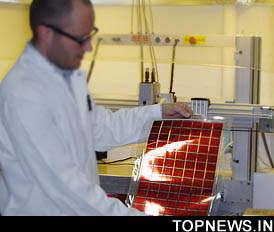Soon, plastic solar cells with higher efficiency
 Washington, Jan 25 : A company in the US is developing plastic solar cells for portable electronic devices, which would have higher efficiency than the current technology.
Washington, Jan 25 : A company in the US is developing plastic solar cells for portable electronic devices, which would have higher efficiency than the current technology.
Solarmer Energy Inc., the company in question, is on track to complete a commercial-grade prototype later this year, according to Dina Lozofsky, vice president of IP development and strategic alliances at Solarmer.
The prototype, a cell measuring eight square inches (50 square centimeters), is expected to achieve 8 percent efficiency and to have a lifetime of at least three years.
"New materials with higher efficiencies are really the key in our industry. Plastic solar cells are behind traditional solar-cell technology in terms of the efficiency that it can produce right now," Lozofsky said. "Everyone in the industry is in the 5 percent to 6 percent range," she added.
The invention, a new semiconducting material called PTB1, converts sunlight into electricity.
It has been invented by Luping Yu, Professor in Chemistry, and Yongye Liang, a Ph. D. student, both at the University of Chicago.
The active layer of PTB1 is a mere 100 nanometers thick, the width of approximately 1,000 atoms.
An advantage of the Chicago technology is its simplicity.
Several laboratories around the country have invented other polymers that have achieved efficiencies similar to those of Yu''s polymers, but these require far more extensive engineering work to become a viable commercial product.
"We think that our system has potential," Yu said. "The best system so far reported is 6.5 percent, but that''s not a single device. That''s two devices," he added.
By combining Solarmer''s device engineering expertise with Yu and Liang''s semiconducting material, they have been able to push the material''s efficiency even higher.
Silicon-based solar cells dominate the market today. Industry observers see a promising future for low-cost, flexible solar cells, said
According to UchicagoTech''s Martin. "If people can make them sufficiently efficient, they may be useful for all sorts of applications beyond just the traditional solar panels on your house rooftop." (ANI)